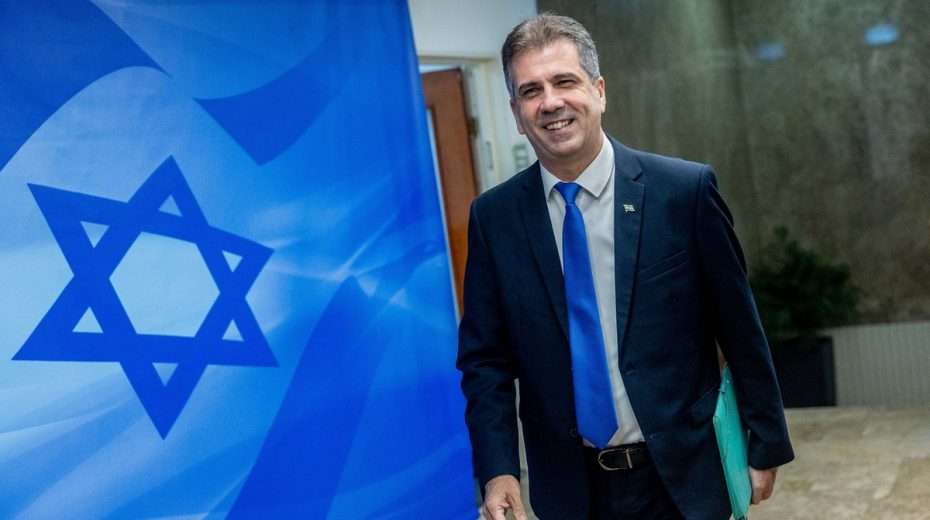Israeli Foreign Minister Eli Cohen is currently very active in forming a new international bloc against Iran after the Gulf states of Saudi Arabia and the United Arab Emirates restored relations with the Islamic Republic. Iran, meanwhile, is busy strengthening and expanding the so-called ‘resistance axis’ against Israel, as we shall see.
Cohen building new anti-Iran bloc
Cohen is currently expanding Israel’s relations with countries in central Asia, with one of those countries Azerbaijan, a Shiite Muslim country, bordering Iran.
Cohen announced during the opening of the Azerbaijan embassy in Tel Aviv on March 29 that he would travel to the capital Baku within a month for talks with the government of Azerbaijan.
That visit took place on Tuesday, April 18, and was mainly about “strategic challenges” that Azerbaijan and Israel have in common.
Cohen said after his meeting with President Ilham Aliyev that the conversation mainly focused on “the fight against terrorism” and on expanding “cooperation” between Israel and Azerbaijan.
Cohen led a thirty-person delegation from Israel and discussed possible contracts in the fields of security, defense, cyber security and innovations in Azerbaijan’s agriculture. The trade volume between Israel and Azerbaijan currently stands at more than $230 million, but this amount is expected to double in the coming years.
As mentioned, however, Cohen’s main focus was on strengthening defense and intelligence cooperation with the government in Baku.
At the end of his visit to Azerbaijan, Cohen said: “Israel and Azerbaijan share the same perception of the Iranian threat. The Ayatollah regime threatens both of our regions, financing terrorism and destabilizing the entire Middle East. We must take action together to prevent Iran from acquiring nuclear capabilities.”
According to various media reports, Israel is operating from Azerbaijan’s territory through its spy agency Mossad, while Iran has repeatedly accused its neighbor of facilitating Mossad actions against its nuclear program.
For example, the Iran nuclear archive that Mossad agents stole from a warehouse in a suburb of Tehran in January 2018 was smuggled to Baku by Mossad in two trucks.
The archive was then flown to Israel from an airport in Azerbaijan.
Mossad, reportedly, also launched unmanned aerial vehicles (UAVs) attacks against nuclear facilities in Iran from Azerbaijan.
Cohen’s visit to Baku came amid steadily growing tension between Iran and Azerbaijan.
In early April Azerbaijan expelled four Iranian diplomats suspected of terrorist activities and espionage.
It was the latest incident in a long series of incidents between the two countries, and a war between the two neighbors can no longer be ruled out.
When that happens, Israel will most likely assist Azerbaijan with more weapons and military advice.
Israel has been supplying arms to Azerbaijan on an unprecedented scale with flight track data showing that 92 cargo planes from Azerbaijan landed at Uvda Air Force Base near Eilat since 2016.
The weapons Israel supplied to Azerbaijan were crucial in the country’s military victory over Armenia in 2020 and September 2022, when another round of fighting broke out over the Nagorno-Karabakh enclave.
Israel has now also strengthened relations with another neighboring country of Iran.
After his visit to Azerbaijan, Cohen flew on to Turkmenistan where he opened the permanent embassy of Israel in the capital Ashgabat. The Israeli embassy in Turkmenistan is now housed in a new building only 17 kilometers from the border with Iran.
The top Israeli diplomat said his visit should be classified as historic, and said he was in Turkmenistan to discuss strategic matters related to “regional security.”
The visit to Turkmenistan was to be viewed as part of an Israeli initiative aimed at strengthening relations with countries in central Asia, Cohen said.
New Israeli initiative
This new diplomatic initiative gained momentum after Iran, the United Arab Emirates and Saudi Arabia recently restored their relations and decided to reopen embassies and other diplomatic missions.
The rapprochement between Iran and Saudi Arabia dashed the Israeli government’s hope to build a regional coalition against the Islamic Republic with Arab Gulf countries.
Prime Minister Benjamin Netanyahu discussed the rapprochement between Iran and Saudi Arabia in a recent interview with the American TV station CBNC and claimed it had more to do with the situation in Yemen, where Saudi Arabia leads a pro-government coalition of Muslim countries fighting the Iranian-backed Ansar Allah, or Houthi militia.
This militia is part of Iran’s resistance axis and repeatedly carried out attacks on Saudi Arabia using Iranian-supplied ballistic missiles and UAVs.
Normalization of relations with Saudi Arabia?
During the CBNC interview, Netanyahu did not rule out that Israel could still normalize relations with Saudi Arabia and hinted that there were still contacts with the government in Riyadh.
Netanyahu said Israel as a world leader in innovation was “important” to the oil-rich kingdom, a clear reference to the largely covert activities of Israeli innovation companies in Saudi Arabia.
Israeli companies are reportedly involved in the construction of the megacity NEOM, a futuristic project along the Saudi Red Sea coast that involves green energy and hydro agriculture.
The Prime Minister was also asked what he thought about recent visits to Saudi Arabia by Hamas leaders and a delegation from the Palestinian Authority.
Netanyahu downplayed these meetings, saying they could have been about the wave of terror that has been plaguing Israel for some time.
This now sounded implausible since Saudi Arabia has been changing its policy towards old enemies for some time now with Hamas as an example of this, and certainly Iran.
Saudi interests
Talks are also underway between the government in Riyadh and the regime of Syrian dictator Bashar al-Assad.
These discussions concern the restoration of relations between Syria and Saudi Arabia, and reconstruction aid for the devastated predominantly Arab country from the Kingdom.
Commentators specializing in Saudi Arabia see all these developments as proof that the government in Riyadh is only interested in its own interests but at the same time, do not rule out the possibility of normalization of relations between Israel and Saudi Arabia in the future.
However, there is clearly a change in the course of the largest Arab country which is widely seen as a response to Israel’s internal turmoil over the judicial overhaul.
This is a wrong assessment too, since Riyadh changed course after the United States failed to meet certain demands to Washington for normalization with Israel which had almost nothing to do with the Jewish state but everything with Crown Prince Mohammed Bin Salman’s distrust of President Joe Biden’s Administration.
The two leaders have had a difficult relationship from the outset of Biden’s presidency and had many differences of opinion on important issues.
Israel’s change of course
For Israel, Saudi Arabia’s change in its policies vis-a-vis Iran was apparently the reason for the shift of attention to Muslim countries in Central Asia in light of the ever-growing threat Iran poses to the Jewish state.
Israel is also reaching out to the European Union because of Iran’s growing threat and wants the EU to up the pressure on the regime in Tehran.
Cohen was recently in Spain that is slated to take over the EU presidency soon and met with EU Foreign Policy chief Joseph Borrell.
During his conversation with Borrell the Israeli top diplomat asked the EU to add the Islamic Revolutionary Guards Corps of Iran to the list of terrorist organizations and to support referring Iran to the UN Security Council over its escalating nuclear weapons program.
Iran’s latest activities and threats
Iran, meanwhile, continues to strengthen its so-called axis of resistance, the loose coalition of terrorist movements and Shiite militias.
Iran’s Foreign Minister Hossein Amir-Abdollahian recently embarked on a regional tour and was in Syria, Iraq and Lebanon that he visited last week.
Abdollahian was also the architect behind the rapprochement with the United Arab Emirates and Saudi Arabia and was in China for talks with Saudi diplomats ahead of the reconciliation between Iran and the Kingdom.
While in Lebanon Abdollahian toured the border with Israel where he claimed that “Zionists only understand power” and that Iran’s recent activities against Israel will lead to its “isolation and destruction.”
Netanyahu reacted to Iran’s escalating threats during the weekly cabinet meeting and said that Israel would not allow Iran to tighten the ring of terrorism around it.
“We are taking action on this matter around the clock, at all times, even now,” Netanyahu said, while vowing again to take all sorts of measures to stop the Islamic Republic.















